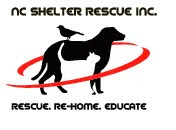We have some wonderful animal shelters here in North
Carolina where you will be meet with a friendly staff, open doors along with
fully vetted and vaccinated animals up for adoption. However if you take a
second look you will find many county animals shelters in North Carolina whose
policy on animals welfare is they have no policy, or what they have changes by
the hour.
In North Carolina you will find so many animals shelters
that are not even open 12 hrs a week, you will find shelters that the staff does
just about everything to discourage the public from coming into their shelter but
what should be a major concern for anyone
else is that many of these animals are never vaccinated ( not even for rabies)
let alone not spayed or neutered before they are adopted or taken in by a
rescue group. So what are we doing in NC to reduce the number of unwanted animals
that make their way into our county shelter system? We ship them off to other
states for them to deal with.
I think it’s wonderful for those who have their heart in the
right place and want to save a “ Southern Animal” from a high kill shelter. But
at what point and after how many years are we going to tolerate the same
process every day that never seems to address the issue at hand of reducing the
number of unwanted animals and the health concerns of our state to help reduce
the spread of rabies, parvo, distemper, heartworms and more?
How or why would North Carolina allow any animal to leave
from their shelters with no vaccinations whatsoever? Let alone allowing these
animals back out into the population without being altered? Why do we not see
all of the counties in North Carolina signing up for the State Spay &
Neuter Program? Why do we not see some local Vets in each county offer to aid
in reducing the numbers of unwanted animals by allowing a lower cost spay and
neuter program to the local residents of their county even if they choose to do”
x” number a year?
We can all agree with North Carolina being such a high kill
state, even with the heavy influx of out-of-state rescue groups and adoptions, clearly
we have a problem and it’s staring us right in the face.
NC needs to address their lack of Spay and Neuter issues one
county at a time, same with the lack of vaccinations.
If everyone would get on board and stop burying their head in the sand we could
reduce our unwanted animal numbers in the first year alone just by spay and
neuter.
a)
Enact an animal licensing fee in each county,
even if it’s only $5.00. Start the process and grow from here.
b)
Establish a core group of local veterinarians in
each county and ask them to help with a free spay and neuter clinic a few times
a year. Even if each vet office only committed to 20-30 spay and neuters a
quarter or year, could you image the impact it would have long term?
c)
Require every county animal shelter to ensure
each animal is spayed or neutered prior to adoption. Raise your adoption fee to
offset these requirements.
d)
Require every county to ensure each animal is
vaccinated esp. for rabies prior to allowing them to be adopted. For those too
young to be fully vaccinated, require the disposition paperwork to be returned to
the shelter once that animal reaches the appropriate age. If the paperwork is
not returned then that person or group is placed on a state-wide bolo alert as
a do-not-adopt.
This is just a start, I’m sure with the large number of Animal
Advocates and Animal Rescue Groups, we can devise a game plan to address these desperately
needed changes. And of course for 2014 to be the year for a Commercial, Non Commercial
Breeder Bill or Puppy Mill Bill to be signed into law.
North Carolina Shelters are overflowing with litter after
litter of kittens and puppies slated to die in 72 hrs. Is this really the best
North Carolina can do? It might be the
situation today but I feel confident if we all place our focus on the core
issues at hand we can change this and be a much more humane and progressive
state on domesticated animal related issues.











